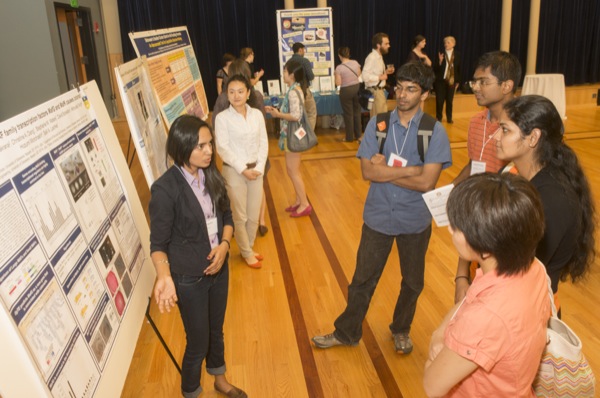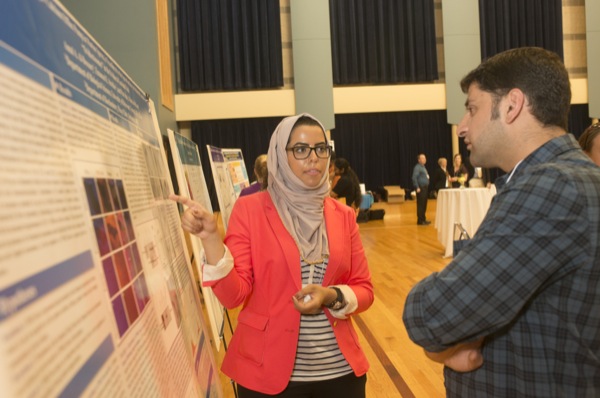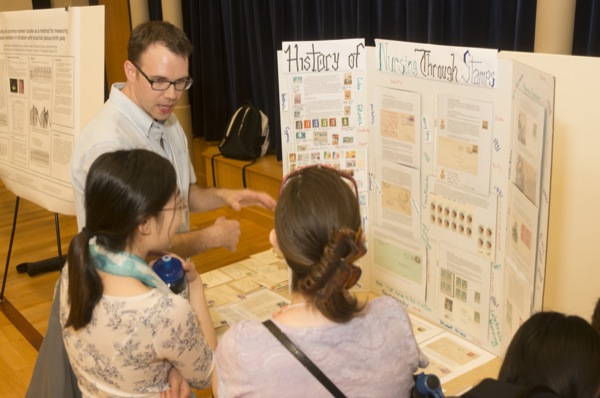


Graduate Student Forum
UD graduate students highlight innovative research at annual forum
12:48 p.m., May 20, 2013--Graduate students from across the University of Delaware shared their research at the third annual Graduate Student Forum on Friday, May 10.
The event featured more than 50 presentations organized into panels as well as 20-plus posters on dozens of topics, ranging from high-performance composite resins, to mental health screening in public housing, to public perception and decision-making during tornadoes.
Research Stories
Chronic wounds
Prof. Heck's legacy
“The Grad Forum is such an important event for us because it allows us to highlight our research, share our findings in an interdisciplinary forum, and get practice for presenting at other conferences,” says Emily Bonistall, president of UD’s Graduate Student Government. “It’s also a fantastic social event where students get to meet new people, enjoy a reception, and have a chance to win fabulous raffle prizes. All around, the day was wonderful, and I look forward to seeing the event continue to grow.”
The following are a few examples of research presented at the event.
Carrie Barnum (biological sciences) is doing work on a disease called “cataract,” which damages the lens of the eye and affects 77 million individuals worldwide. “We have identified a novel RNA binding protein TDRD7, mutations in which are associated with cataract in children,” she said. “My project focuses on TDRD7 null mouse mutants, which develop cataracts similar to humans, to characterize the role of post-transcriptional control of gene expression within the lens and understand why its disruption results in cataracts.”
Megan Barolet-Fogarty (human development and family studies) discussed her work on the impact of immigration on Latino families. She pointed out that Latinos in the U.S. are highly heterogeneous, with broad variation in socioeconomic class, education, region, race, and nationality. Challenges in understanding the impact of immigration on these groups include changing gender roles, the evolution from a manufacturing economy to a service-based one, and transnational families.
Sarah Markland (animal and food sciences) is investigating the plant-microbe interactions that take place between plants and foodborne pathogens as well as the plant defense strategies potentially utilized by leafy greens against foodborne bacteria and viruses, including E. coli, Salmonella, and norovirus. “By understanding the mechanisms by which plants interact with foodborne pathogens, we may be better able to develop strategies to reduce microbial contamination of crops in the pre-harvest environment, including the use of rhizobacteria as a biotcontol agent,” she said.
Evan Matthews (applied physiology) is investigating the effects of dietary sodium on vascular function. “The available literature on this subject is complicated by the heterogeneous blood pressure response often observed,” he said. “However, our recent data shows that regardless of the blood pressure response, there is a similar decrease in function of the crucial inner most layer of the artery, which is partially responsible for the control of blood flow.”
Sandie Petrie (art) used her portfolio as the basis for discussing gender construction through adolescence. “Art can be used to express relationships between individuals and between people and the community,” she said. “It also allows us to explore how landscape shapes personality.”
Katherine von Duyke (education) shared her work on students’ autonomy, agency, and emergent learning interests in two open democratic schools. “Conventional education is content based,” she explained, “while progressive education attends to student interests and creativity.” Her work has shown that students can learn without a curriculum, although a more conventional educational environment can help meet their need for greater complexity as they get older.
Article by Diane Kukich
Photos by Duane Perry










